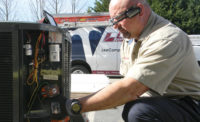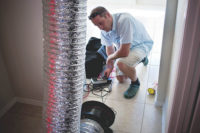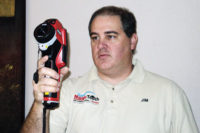For many contractors, HVACR runs in their blood. Family businesses have long been a mainstay of the industry, and multigenerational companies are proud of their HVACR heritages. Yet, descendants who work in family businesses also acknowledge that leadership succession can be extremely challenging.
“Usually, the second-on-up generations are not techs and tend to shy away from getting dirty,” said Rich Imfeld, third-generation president of I.C. Refrigeration in Ceres, California. “There are exceptions, but the perception of the next generation is a spoiled college kid who won’t get dirty.”
In spite of the challenges, many contractors have successfully passed the torch to succeeding generations and are now planning for future transitions.
ESTABLISHING CREDIBILITY
As the grandson of the company founder, Imfeld said he learned that the succeeding generations must be respectful of all company employees.
“Show employees respect, be there for them, be consistent, and put their needs before your own,” he said, adding that this approach will enable the typical college kid to gain the credibility needed to work in and eventually lead a family business.
“Dad never pushed me into the business. He insisted that I learn all aspects of the industry from others,” Imfeld said, noting that he worked for a Ruud distributor during his undergrad years. After a few years, Imfeld said his father, Dick Imfeld, asked him to come home and take over I.C.’s service team.
“It was an underperforming department,” Imfeld explained. “I’m not a tech, but as an engineering type, I know what makes sense. So I could challenge what they were saying by using logic.”
Of course, he noted, there was initially some resistance to his leadership, adding, “I think we lost one tech.”
Sending the upcoming generation out to work outside of the family business is a great way to prepare them for future management roles, according to Wayne Rivers, president of the Family Business Institute. Rivers has been working as succession consultant for almost three decades, and the majority of his clients are commercial contractors.
Rivers gave a hypothetical example of how outside experience can help the next generation achieve credibility and overcome the leadership gap.
“Let’s say we have a mechanical contracting business in Michigan, and we send Junior to a friendly competitor down in Ohio, where he will start off as a project engineer and then move on to estimating,” Rivers said. “He’s going to earn his spurs, by God, and then he’s going to be a blessing to us.”
Plus, Rivers pointed out, “The mistakes Junior made as a rookie were made on someone else’s nickel.”
TIMING TRANSITIONS
Another crucial part of successfully establishing the next generation of leaders within a family business is timing.
According to Rivers, it’s incredibly important for business owners to give themselves enough time to plan and successfully transition the younger generation into leadership roles.
“The rule of thumb is 10 years is the best transition time,” Rivers said. “That gives plenty of time for the older generation to transition out and for the new generation to transition up.”
Historically, of course, there wasn’t as much emphasis on transition planning. The next generation often had to step up due to unforeseen circumstances.
“My grandfather’s lung collapsed in 1964,” Imfeld said. “My father had been in the business for about a year and was thrust into the [leadership] position with my grandfather under doctor’s orders to slow down.”
Others who have been in the business for generations have similar stories. Butch Welsch, fourth-generation president and owner of Welsch Heating and Cooling Co. in St. Louis, said his family’s business was established in 1895 by his great-grandfather.
“My dad’s dad took over the business in 1910 and ran it until he passed away suddenly in August of 1929. My dad was just a sophomore in high school at the time, and he had to quit school to take over the family business,” Welsch said. “Somehow, and I’m not sure how they did it, but my dad, with his mom’s help and the help of my mother, was able to keep the business going.”
In contrast to these sudden changes in leadership, Imfeld and Welsch were both able to slowly transition into ownership positions.
Welsch joined his father at the family business in 1963, immediately after graduating from college. In the late ‘60s, his father developed a cattle ranch and started spending about half of his time at the ranch.
“As a result, I started operating the business when he was gone. This allowed me to learn but also know I could seek his input during the three days he was in the office,” Welsch explained. “Because Dad was part-time for several years, that situation allowed me to transition into a leadership role without having to assume full responsibility. When he passed away [in 1986], I felt I was fairly well-prepared to take over the operation of the business. At that time, I took over full ownership and management of the company, and I have retained those roles since that time.”
Rich Imfeld also was able to transition gradually into his role as president. Among the lessons learned during the transition, Imfeld said, “It was important for my dad to establish a date where he would relinquish the day-to-day operations to me.”
Travis Smith, president and second-generation owner of Sky Heating & Air Conditioning in Portland, Oregon, said his transition to leadership started after he graduated from college in 2007.
“My father retired in 2013, and his business partner retired in 2014,” Smith said. Looking back at how he prepared to take the reins from them, Smith said, “I started out in the field and worked there from 2001 until 2008. In 2008, I became service manager, and in late 2009, I began selling while still running our service department. In 2012, I slowly started to take over the sales manager position, which my father was doing, and from 2012 on, I started learning accounting and management and began overseeing the sales team.”
Along the way, there were a few bumps in the road that pushed the transition back, Smith added. A business partner who was supposed to help purchase the business with Smith left the company, and the economic downturn slowed things down even more. Yet Smith was ready to take over when his father retired, and he has since focused on growing the company through acquisitions and expansions.
FINANCING OWNERSHIP
In addition to training the next generation to step up and lead, it’s also important to consider how the ownership transfer will be financed.
Rivers advocates for requiring the next generation to buy into the company, although he said certified public accountants (CPAs) and financial planners often advise business owners to gift the company to their children.
“CPAs are consumed by tax avoidance,” he said, which leads them to recommend passing on the company as a ‘tax-free gift.’”
Putting it bluntly, Rivers said, “People appreciate things they pay for more than things that are given to them.”
He continued, “If you want a nice house, you should pay for it. If you want a nice car, you should pay for it. If you want a nice business, you should pay for it. That’s our philosophy. Most of our clients understand that intuitively, but their advisors have been telling them to give, give, give.”
At I.C. Refrigeration, Imfeld said, “I was gifted a small amount of stock, and I had to purchase some stock, so I had skin in the game.”
At Sky Heating and Air Conditioning, Smith purchased the company in four portions.
“The first [portion] was from the business partner who was supposed to take over the company with me when he left,” Smith said. “The second was a small portion from my father, so he still had majority control. The third was the rest of my father’s shares, and the fourth was his business partner’s shares. We have loan agreements set up between us with interest rates and payment schedules. The only difference between taking the loan from my father instead of a bank was that I didn’t have to go through a lengthy qualification process.”
Roger Gundlach, fourth-generation owner of Gundlach Sheet Metal Works Inc. in Sandusky, Ohio, said he’s always hoped his family would retain ownership of the company.
“One of our philosophies has always been to make it easy for the next generation to own the family business. That’s just my family. We kind of treat the business as, ‘It’s not my business — it’s our family’s business,’” he said.
Gundlach became president of the business in 1986 when his father became ill. He became the principal stockholder in 1988 after working out an arrangement with his mother and two brothers.
“In 1986, my father was diagnosed with lung cancer, and he had to have surgery and treatment, and he never recovered,” Gundlach said. “He passed two years later, and during that two-year period, when I was president of the company, I sat down with my brothers and said, ‘How are we going to work this out? We need to do something about Dad’s ownership stake [since] he still owns half the business.’”
Previously, Gundlach said, he and his older brother had bought his uncle out. But at this time, his older brother didn’t want to make the financial commitment, and his younger brother wasn’t interested in more ownership.
“We came to an agreement, and I said, ‘The only way the agreement will work is if you two and Mom agree to my purchase arrangements,’” Gundlach said. “We put an agreement together, and everybody said it was fine, so I ended up buying most of my father’s stock, and that’s when I became the majority stockholder.”
Gundlach noted he’s been fortunate with how his family has avoided contention over company ownership. He reiterated how important it was that his family — including his father, mother, and uncle — made it easy for him to buy the company stock.
“They financed the buyout [and allowed me to make] affordable payments,” Gundlach said, adding that in the not-too-distant future, he plans to make it easy for the fifth generation to buy the business.
INSPIRING CONFIDENCE
While there may be a general expectation that the next generation will eventually take over, business owners should never rely on this assumption. The question of who will take over the family business next can be an extremely sensitive topic but it shouldn’t be avoided.
Often, Rivers said he sees contractors rationalize that the succession will just work out because family members all love each other.
“Love and affection are no substitutes for rock-solid planning,” he said. “This is the biggest project you’re ever going to have, so take a project-management approach.”
Of course, the age and status of the current owner factor heavily into the planning and consideration of this issue.
Since Sky Heating and Air Conditioning just completed its first ownership transfer three years ago, the next succession is not a hot topic.
“As of right now, there is no succession plan, since I am 32 and hopefully have another 30 years at the helm,” Smith said. He added, “My son is only 11 months old, so he is also not at an age to take over.”
But at Gundlach Sheet Metal Works, succession planning is currently of paramount interest. Roger Gundlach is 66, and several months ago he hired a succession consultant to help plan for the company’s fifth generation of family ownership.
“We have a plan right now for how we’re going to continue to train my son and his cousin to move forward in the company and be ready to take over management of the company,” Gundlach said.
Gundlach’s son, Andrew Gundlach, and second cousin, Terry Gundlach, currently work as department managers. Andrew manages the building automation systems (BAS) department, and Terry runs the construction department.
“The succession consultant and I have some goals as to when the two of them will move into positions of more responsibility, in maybe a year or so, and then take another step in a couple of years,” Gundlach explained. “And, then, as that happens, it’s my plan to continue to back off.”
He added, “I wanted everybody else in the company to know we were hiring these consultants, and they were going to put together the best plan for us.”
While the Gundlachs plan to promote family as the next leaders of the company, other family businesses are also considering less traditional approaches to succession.
“Many contractors are looking outside their families for succession,” Rivers said. “Many are looking to transition the company from one generation to the next, but it might not always be blood.”
For instance, he said, a top employee may make the best successor, while a son or daughter may be good at other facets of business.
“But, if you put [these people] together, they make a terrific team,” Rivers said. “Part of it is trying to figure out the best ownership and management arrangements. The question is, ‘Why do the ownership and management always have to go together?’ And the answer is, ‘They don’t.’”
At Welsch Heating and Cooling, Welsch has no plans to retire and wants to continue working as long as he can. But he has also begun to transition various functions of leadership to several key people at his company.
“Our son-in-law, Matt Finch, works for us and handles all of the new residential sales and estimating. We have a comptroller, Paul Heimann, and service manager, Denise Webb, both of whom are responsible for the operation of the company in my absence,” he said. “I have attempted to teach [these three individuals] the importance of being leaders and not bosses.”
Welsch reiterated, “We will be gradually transitioning the leadership functions as I desire to spend more time away from the business, but there is really no timetable for that to occur.”
As the HVACR industry continues to evolve, it’s clear that family businesses will evolve, as well. And despite the difficulties family businesses may face, these companies are continuing to pass on a proud HVACR heritage.
Publication date: 9/5/2016
Want more HVAC industry news and information? Join The NEWS on Facebook, Twitter, and LinkedIn today!








